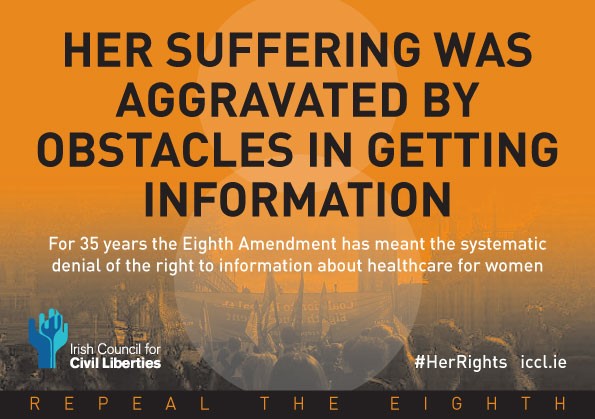The Eighth Amendment means that pregnant people in Ireland are routinely unable to access information about the best healthcare available to them. This is a violation of the right to information about healthcare as enshrined in law.
The UN Human Rights Committee, on 12 June 2017, found that the state had subjected Siobhán Whelan to cruel, inhuman and degrading treatment; denial of information; violation of her rights to equality and non-discrimination on the ground of sex; and arbitrary interference in her right to privacy after she was forced to travel to Liverpool for an abortion at 21 weeks and five days of pregnancy, following a diagnosis of fatal holoprosencephaly. It stated that:
“[her] suffering was further aggravated by the obstacles she faced in receiving information she needed about appropriate medical options from her known and trusted medical providers. […] health professionals in Ireland did not provide her with clear and detailed information on how to terminate her pregnancy in another jurisdiction or from which other health care providers she could obtain such information, thereby disrupting the provision of medical care and advice that she needed and exacerbating her distress.”
In this case, likely because of a fear of legal consequences, medical professionals did not provide Ms. Whelan with information she needed. The chilling effect that the Eighth Amendment has on providing healthcare information means that a woman’s right to information about healthcare options is systematically and routinely violated when she becomes pregnant in Ireland.
“Wait for nature to take its course”
Ms. Whelan reported feeling totally isolated during this time. In Wexford she had been told that in another country she would be offered a termination but that in Ireland she would have to “continue with the pregnancy, attend ante-natal appointments ‘as normal’ and wait for nature to take its course.”
When the fatal foetal anomaly was confirmed by the National Maternity Hospital, she received no information about travelling for an abortion, apart from a remark that there had been “good reports” about Liverpool Women’s Hospital. She indicates that she “felt it was illegal to even discuss this or ask too many questions for fear of having the door slammed in our faces or of not receiving any help whatsoever.”
Ms Whelan was thus forced to share information about her pregnancy with acquaintances and her employer in order to obtain information. She reported “feeling like a criminal” whilst travelling, as well as being unable to process her grief owing to being consumed by the travel arrangements.


